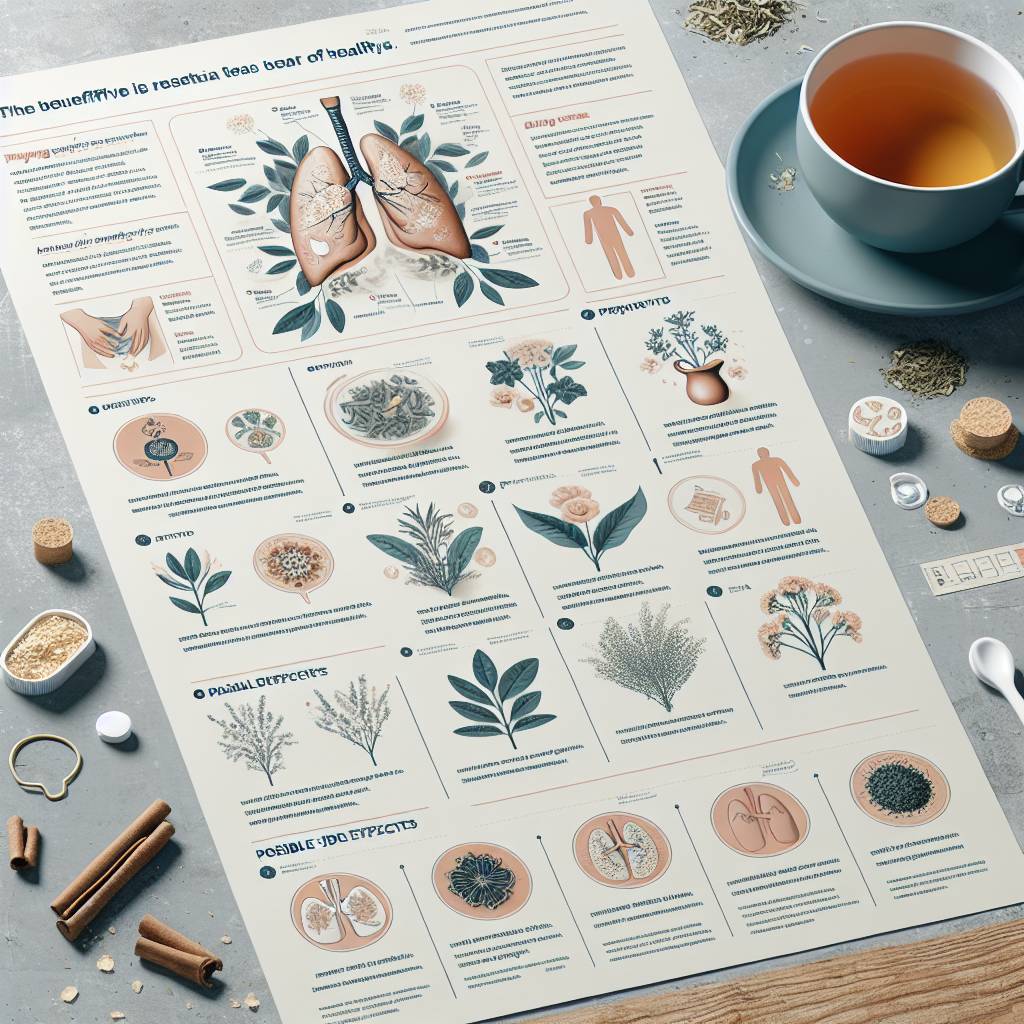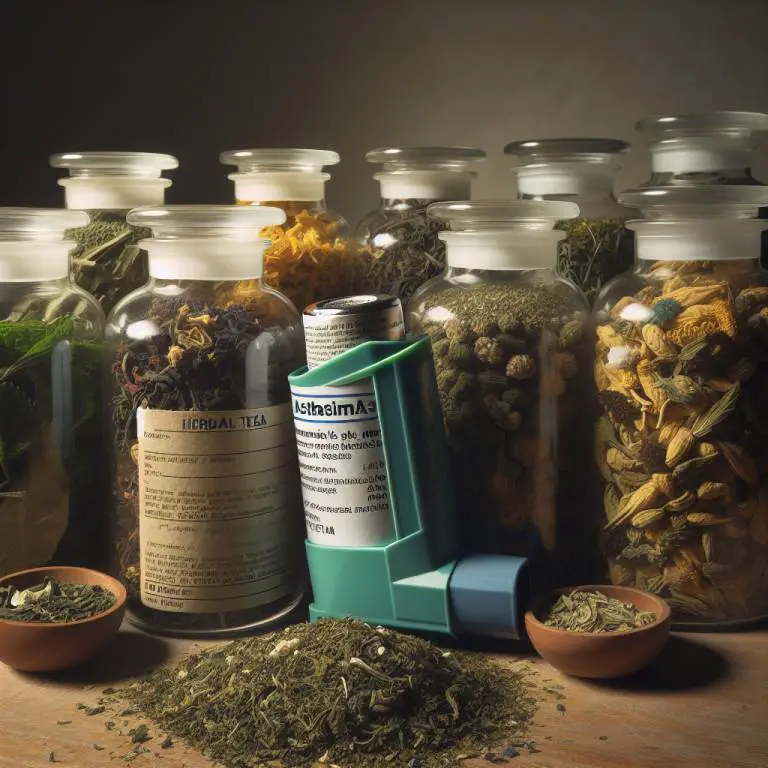Safety tips for using herbal teas for asthma
When using herbal teas for asthma, always start with small amounts to see how your body reacts. It’s important to talk to a doctor before trying new herbal remedies, especially if you’re already taking medication for asthma. Be aware of potential side effects like allergic reactions or interference with your current treatments. Staying informed and cautious ensures the safe use of herbal teas for managing asthma symptoms.

What Are the Benefits of Herbal Teas for Asthma?
Herbal teas have been used for centuries to help with many health issues, including asthma. They can soothe the throat, reduce inflammation, and even help open up the airways. This makes breathing easier for people with asthma.
Drinking herbal teas can also provide a calming effect. Stress is a known trigger for asthma attacks. By reducing stress levels, herbal teas indirectly help in managing asthma symptoms more effectively.
Which Herbal Teas Are Most Effective for Asthma Relief?
Ginger tea is one of the top choices for asthma relief. It has anti-inflammatory properties that can help reduce airway inflammation. Another great option is peppermint tea. It contains menthol, which helps relax the muscles of the respiratory tract.
Licorice root tea is another beneficial choice for those with asthma. It’s known to soothe the throat and reduce irritation in the airways. However, it’s important to note that licorice should be used cautiously as it can cause high blood pressure when consumed in large amounts.
Learn how tea can be a part of asthma management. Discover effective types and how to brew them.
How Can Herbal Teas Be Safely Incorporated into an Asthma Management Plan?
Incorporating herbal teas into an asthma management plan should be done carefully and thoughtfully. Start by introducing one type of herbal tea at a time to see how your body reacts to it. It’s also a good idea to keep track of any changes in your symptoms or overall health.
Consulting with a healthcare provider before adding herbal teas to your routine is crucial, especially if you’re already taking medication for asthma. They can provide guidance on which teas might be most beneficial and ensure there are no potential conflicts with your current treatment plan.
What Precautions Should Be Taken When Using Herbal Teas for Asthma?
While herbal teas can offer benefits for managing asthma, it’s important to use them wisely. Always check the ingredients list to make sure you’re not allergic to any components of the tea. Some herbs can trigger allergic reactions or interact negatively with medications.
Avoid relying solely on herbal teas as a treatment for asthma. They should complement your existing management plan rather than replace prescribed medications or therapies recommended by your doctor. Remember, maintaining open communication with your healthcare provider about all aspects of your treatment plan is key.
| Herbal Tea | Safety Tips | Potential Side Effects |
|---|---|---|
| Ginger Tea | Limit to 2-3 cups/day. Consult with a healthcare provider if on blood thinners. | Heartburn, stomach upset |
| Peppermint Tea | Avoid if you have GERD or hiatal hernia. Not recommended for infants or small children. | Heartburn, allergic reactions |
| Licorice Root Tea | Avoid long-term use. Limit intake due to potential increase in blood pressure. | High blood pressure, water retention, potassium depletion |
| Eucalyptus Tea | Use with caution if you have liver disease, diabetes, or low blood pressure. Avoid during pregnancy and breastfeeding. | Nausea, vomiting, diarrhea |
| Mullein Tea | Start with small doses to check for allergic reactions. Consult healthcare provider before use if pregnant or breastfeeding. | Breathing difficulty, skin irritation |
| Note: Always consult with a healthcare provider before starting any new herbal tea regimen, especially for chronic conditions like asthma. | ||
Are There Any Side Effects of Using Herbal Teas for Asthma?
When considering herbal teas for asthma, it’s important to be aware of potential side effects. While many people find relief in these natural remedies, some might experience allergic reactions or irritation. This is because the compounds in certain herbs can trigger adverse responses in sensitive individuals.
Moreover, excessive consumption of some herbal teas may lead to gastrointestinal issues such as nausea or diarrhea. It’s crucial to start with small amounts and pay attention to how your body reacts. Consulting with a healthcare provider before adding herbal teas to your asthma management plan is always a wise decision.
How Much Herbal Tea Is Safe to Consume for Asthma Patients?
The safe amount of herbal tea can vary widely depending on the type of herb and the individual’s health condition. Generally, one to two cups per day are considered safe for most people. However, it’s essential to research and understand the specific herb you’re interested in, as some might require more caution.
Listening to your body is key. If you notice any discomfort or adverse effects after drinking herbal tea, it might be best to reduce the quantity or stop altogether. Always remember that while herbal teas can complement asthma treatment, they should not replace prescribed medications without professional advice.
Can Herbal Teas Interact with Traditional Asthma Medications?
Yes, interactions between herbal teas and traditional asthma medications are possible and could impact the effectiveness of your treatment plan. Some herbs have properties that can either enhance or diminish the effects of certain drugs. For instance, Echinacea is known for boosting immune system activity but might interfere with immunosuppressants used by some asthma patients.
To avoid any harmful interactions, it’s crucial to inform your doctor about all the herbs you’re considering adding to your regimen. Healthcare professionals can provide guidance on which herbal teas are safe to consume alongside your current medications. This precaution ensures that both treatments work harmoniously without compromising your health.
Final Thoughts
Incorporating herbal teas into an asthma management plan could offer additional relief and support overall well-being. However, like any treatment option, it comes with considerations such as potential side effects, appropriate dosages, and interactions with other medications.
Making informed decisions based on research and professional advice will help maximize the benefits while minimizing risks. Remember that managing asthma effectively requires a comprehensive approach that includes medical treatment, lifestyle adjustments, and possibly natural remedies like herbal teas.







